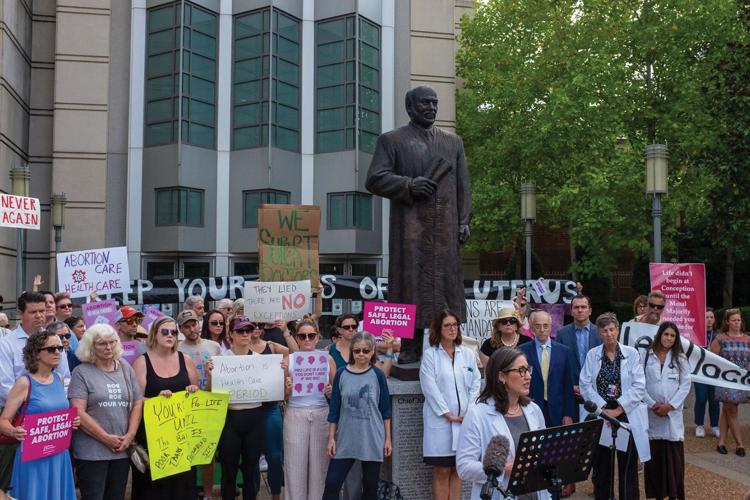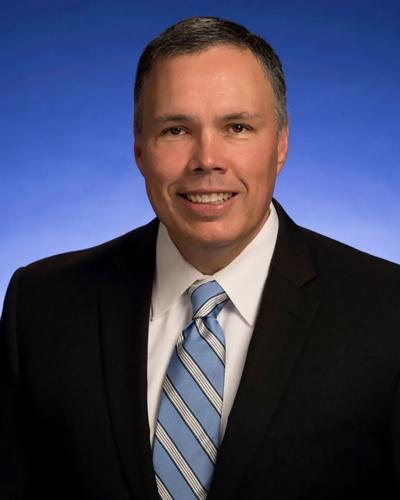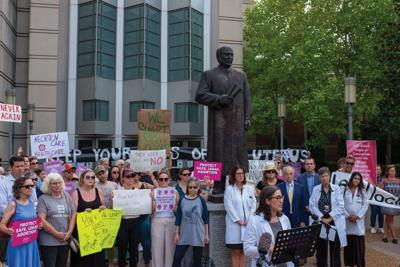A bill on its way to Gov. Bill Lee’s desk will allow physicians to refuse care to individuals if it violates — per the legislation’s language — their “conscience.”
At least one physician says the bill is too broad and redundant, and could be detrimental to rural patients. While being discussed in one committee, the legislation, called the Medical Ethics Defense Act, was linked to abortion care, gender-affirming care and euthanasia.
The bill was written by the Alliance Defending Freedom, an Arizona-based conservative Christian legal advocacy group that has also advocated for legislation limiting abortion and gay marriage and targeting transgender people. The organization has worked to pass such legislation in six other states in the past seven years.
Erica Steinmiller-Perdomo, an attorney at the ADF, traveled to the Tennessee General Assembly to testify on behalf of the bill in March. She claimed that similar laws in Illinois, Ohio, Arkansas, Mississippi, South Carolina, Montana and Florida have not been challenged legally.
The Alliance Defending Freedom helped a New York City surgeon bring a case against her employer for being asked to participate in an abortion, among other lawsuits.
“There are doctors who practice medicine consistent with a pro-life worldview in which an abortion is never medically necessary,” Steinmiller-Perdomo said, “and there are procedures that are available to treat a woman in that circumstance without having to perform an elective abortion.”

Rep. Bryan Terry (R-Murfreesboro)
Current Tennessee law in part states, “A health care provider may decline to comply with an individual instruction or health care decision for reasons of conscience,” though the Medical Ethics Defense Act offers additional legal protections for health care workers who may go against generally accepted medical standards. State law also protects physicians from having to give “medically inappropriate health care.”
Sponsor Rep. Bryan Terry (R-Murfreesboro) said at a House Health Subcommittee meeting in March that he thought the bill would assist in a physician shortage and put the state in a better place to recruit and retain physicians.
One physician Tennessee has gained is urogynecologist Dr. Jonathan Shaw, who currently practices in Chattanooga. He claims he was pressured to participate in gender-affirming care in New Hampshire and looked for a different job before he was “pushed out.” He was attracted to Tennessee because of what he calls “common-sense policies that preserve the freedom to be guided by conscience.”
“If one doctor’s allegiance is to the patient, I would say that my conscience allegiance is to the designer of the patient, the God that created the universe and the rules and laws that we live by,” said Shaw during the committee meeting. “I can have allegiance to both. The patient, to do no harm, and to the God of the patient as well. One does trump the other.”
Michael Chupp, CEO of the Christian Medical Association, also testified in favor of the bill, noting that the organization has 538 members in Tennessee. ADF lawyer Greg Chafuen listed euthanasia, prescribing an abortion pill and “gender issues” as examples of where the bill could come into play. (A bill that would allow adults suffering from terminal disease to end their lives with medication was tabled earlier this year.)
Education, health care and development legislation makes its way through General Assembly
Primary care physician Dr. Amy Gordon Bono said in a committee meeting that the General Assembly could address “moral injury” in a more meaningful way — with measures that address the high cost of care, for example. “I see nothing in this bill that alleviates the regular burdens of health care workers,” she said.
Rep. Susan Lynn (R-Mount Juliet) asked if a physician should have the right to refuse gender-affirming care. Bono suggested tailoring the bill just to that procedure.
Bono points out that the bill does respect the federal Emergency Medical Treatment and Labor Act, meaning physicians would still be required to offer care in emergency situations. But the gray area, she tells the Scene, is care that may be urgent but not emergent.
“You can still have medical issues that are urgent, but are not emergent, that would still lead to a delay in care of the patient, potentially,” Bono said. “We’ve encountered this plenty of times, especially in the care of pregnant patients. Where do we draw the line between what is urgent versus emergent? How can we take steps to keep someone from succumbing to an urgent issue that is not yet emergent?”
The bill might also be more detrimental in rural areas.
“Ultimately when someone denies a patient care, that patient still needs help, and we just don’t have a good number of health care providers in rural areas,” Bono says. “Sometimes there’s only one person to turn to, and there’s nobody else to take that person’s place, so the person just ends up being denied health care.”








